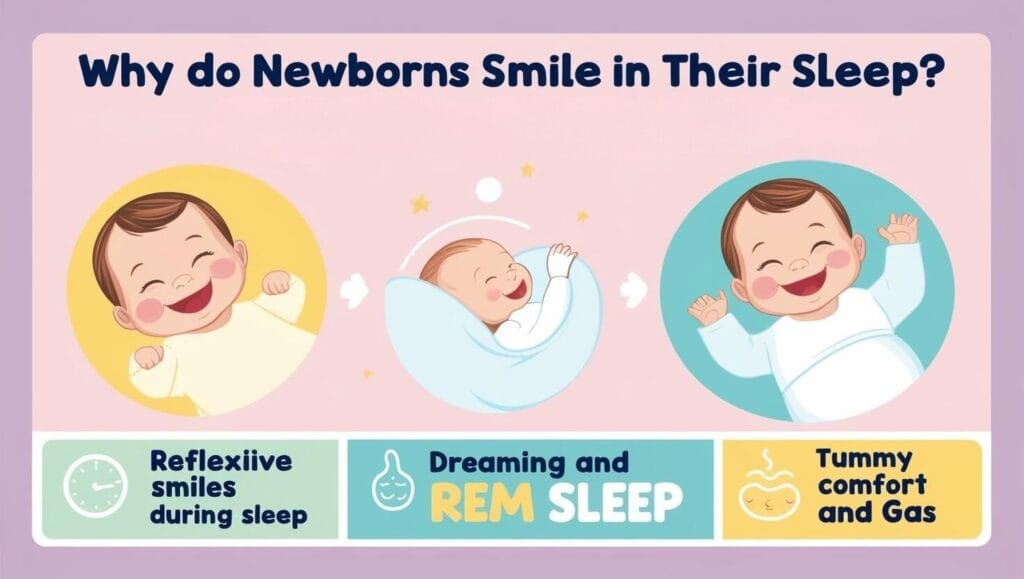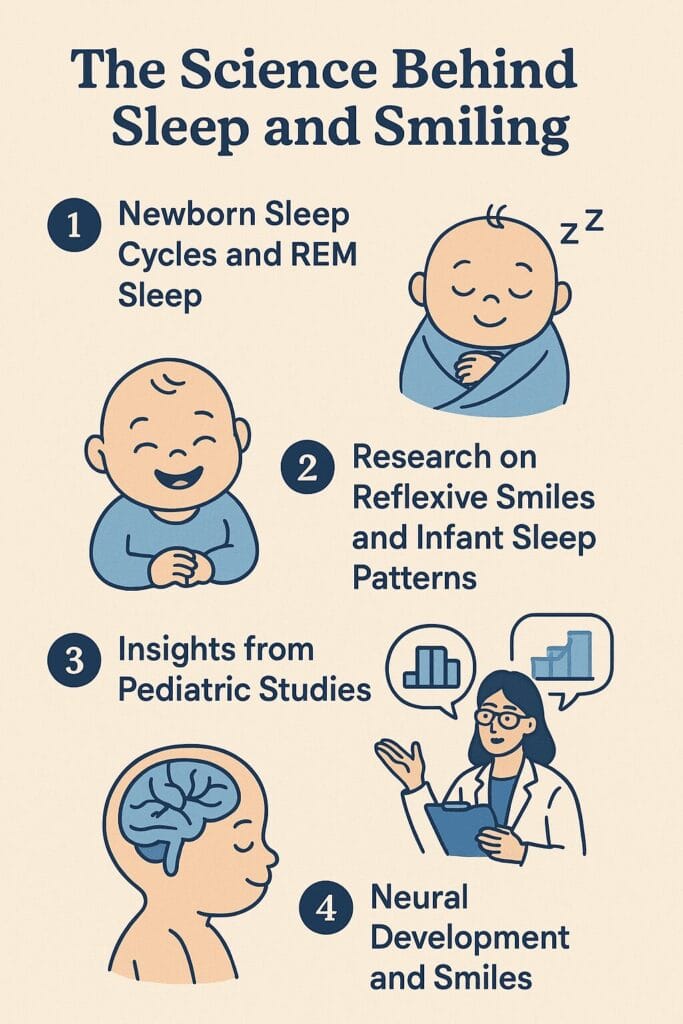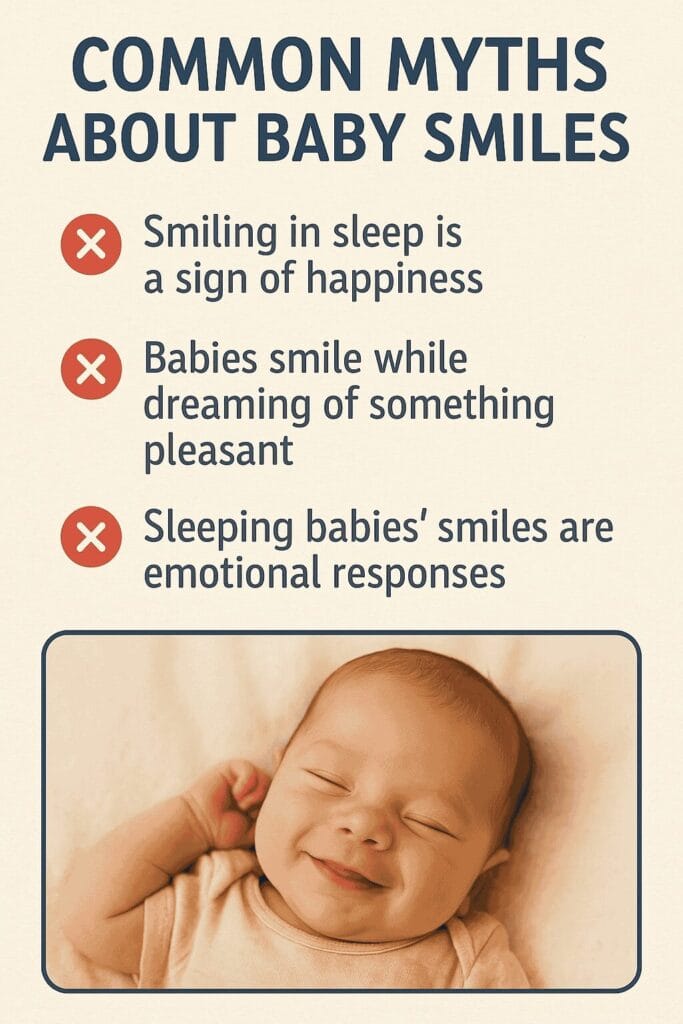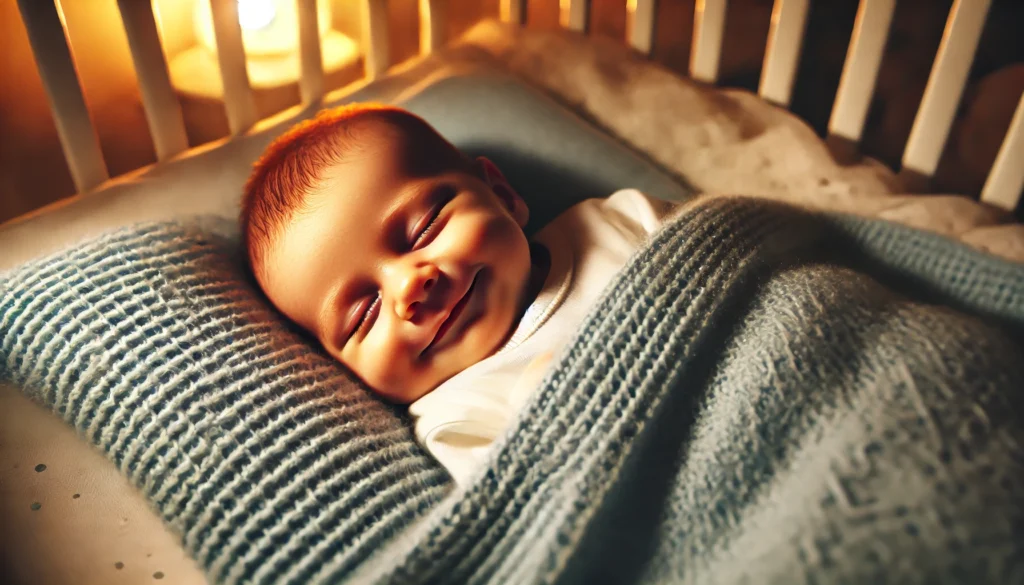Wondering why do newborns smile in their sleep? Discover the fascinating reasons behind why do newborns smile and laugh in their sleep, and learn what it means for their development.
Introduction
A baby’s first smile is one of the most cherished milestones in a parent’s life. It signifies growth and development and the beginning of a deeper connection between the baby and its caregivers. However, while babies often smile when they’re awake, many parents also notice that their little one smiles in their sleep. This raises the question: Why do newborns smile in their sleep?
Is it a sign of happiness, or is there a deeper, physiological reason behind it? In this article, we’ll explore the many possible explanations for why do newborns smile in their sleep, whether it’s related to sleep cycles, reflexive behavior, or even the baby’s neural development. Additionally, we’ll discuss when babies start to smile purposefully and how these early smiles help lay the groundwork for emotional connections.
Table of Contents
The Nature of Newborn Smiles
Reflexive Smiles
In the first few weeks of life, babies’ smiles are most often reflexive. This means that a baby’s smile isn’t necessarily a response to joy or happiness but instead a reaction to physical stimuli or internal sensations. These reflexive smiles are often triggered by things like gas, hunger, or the baby’s own muscle movements.
Why do newborns smile in their sleep? Reflexive smiles are commonly observed during sleep, where the baby’s body and facial muscles relax and undergo spontaneous movements. In this early stage of development, these smiles are a sign that the baby’s nervous system is starting to function and regulate facial muscles.
As babies grow older and their nervous systems mature, these reflexive smiles become more intentional and transition into social smiles. But in the early stages, newborns smile more often in their sleep as a natural part of their brain’s development.
Neurological Development and Smiling
Reflexive smiles during sleep help strengthen the muscles in a baby’s face that will eventually be used for more purposeful, social smiles. These smiles are the first signs that the baby’s nervous system is forming and becoming more coordinated.
In the first few weeks, why do newborns smile in their sleep is due to these reflexes happening as a result of the baby’s nervous system maturing. It’s not an emotional response but a reflexive movement that is part of the baby’s early development. The ability to smile purposefully comes later as the baby’s muscles become more coordinated and their brain learns to control those muscles with intention.
If you’ve noticed that your baby is rolling onto their stomach while sleeping but can’t roll back, it’s natural to feel concerned. In our article, Baby Rolls Onto Stomach While Sleeping But Can’t Roll Back – What to Do?, we explore the important safety precautions to take and share expert advice on how to handle this developmental milestone.
Why Do Newborns Smile in Their Sleep?

Now that we’ve established the basic concept of reflexive smiles, let’s explore why newborns smile in their sleep. Understanding the stages of sleep and brain activity can help explain this fascinating phenomenon.
Reflexive Smiles During Sleep
A major reason why do newborns smile in their sleep is that babies spend a lot of time in REM (Rapid Eye Movement) sleep. REM sleep is a deep sleep stage in which the brain becomes highly active and processes sensory information. During REM sleep, babies’ facial muscles, including those used for smiling, may move involuntarily, causing the baby to smile without any emotional stimulus.
Because babies spend a large portion of their sleep in REM sleep, this stage allows for spontaneous facial expressions like smiling. These smiles are not linked to happiness but are part of the natural sleep process. They are reflexive movements associated with brain activity during this phase of sleep.
Dreaming and REM Sleep
Though it’s impossible to know exactly what babies dream about, researchers believe that REM sleep plays a key role in brain development. Why do newborns smile in their sleep during this phase? It’s possible that the rapid eye movements and brain activity in REM sleep trigger facial expressions. Just like adults, who smile during dreams in response to positive imagery, babies may smile during REM sleep as a response to their own internal brain activity.
However, unlike adults, infants are not paralyzed during REM sleep. This difference in REM sleep means that babies can display physical expressions, including smiling, while their brains process sensory data and internal experiences.
Tummy Comfort and Gas
Another explanation for why newborns smile in their sleep may be tied to their digestive system. A newborn’s digestive system is still developing, and they frequently experience discomfort, such as gas or bloating. During sleep, these physical sensations can trigger reflexive facial movements, including smiles.
Why do newborns smile in their sleep when their digestive system is active? When a baby has a full stomach or is experiencing relief from gas, their body may naturally release tension, which can result in facial expressions like smiling. Although this type of smile is not a direct response to happiness, it is a reflection of the baby’s internal sensations.
The Science Behind Sleep and Smiling

Newborn Sleep Cycles and REM Sleep
Newborns have shorter sleep cycles than adults, with their sleep lasting only 50 to 60 minutes. However, a significant portion of a newborn’s sleep cycle is spent in REM sleep, sometimes as much as 50% of their total sleep time. This extended REM sleep is one reason why newborns smile more often than adults. During REM sleep, the brain is most active, which could trigger involuntary facial expressions, including smiling.
It is also important to note that newborns smile in their sleep during REM sleep because they are not paralyzed as adults are during this phase. This allows their facial muscles to move and produce expressions like smiling.
Research on Reflexive Smiles and Infant Sleep Patterns
One of the most intriguing findings in research about why do newborns smile in their sleep is the connection between reflexive smiling and the sleep patterns of newborns. Reflexive smiles, also known as “sleep smiles,” occur involuntarily during the REM (Rapid Eye Movement) phase of sleep. This phase of sleep is associated with high brain activity and is critical for processing sensory input and brain development. As newborns experience a significant amount of REM sleep, they are more likely to exhibit these reflexive smiles.
Studies indicate that these smiles are part of the body’s natural reflexes rather than emotional responses. Reflexive smiles are thought to be linked to the early stages of neurological development, particularly the brain’s control over facial muscles during sleep.
Insights from Pediatric Studies
Pediatric studies have provided further insight into why do newborns smile in their sleep. These studies emphasize that smiling during sleep is often a sign of the brain’s maturation rather than an emotional reaction. The first few months of life are characterized by rapid brain growth, and reflexive smiles serve as one of the first visible indicators of this development.
Additionally, pediatricians have observed that these sleep smiles are most common during the early stages of REM sleep when the brain is most active. As babies continue to grow, their brain activity and muscle control become more coordinated, leading to more intentional facial expressions, although reflexive smiles remain a part of their sleep patterns.
The 8-week sleep regression can be a challenging time for both you and your baby. If you’re struggling with sleep disruptions, Mastering the 8-Week Sleep Regression: Proven Strategies to Get Your Baby Sleeping Again offers practical tips and expert strategies to help your baby through this phase.
Neural Development and Smiles
The smiles that babies produce during sleep are often linked to their neural development. The cerebral cortex, which is responsible for motor control and sensory processing, is active during REM sleep. The reflexive smiles that babies display during sleep are part of the brain’s way of exercising and coordinating the muscles required for more complex facial expressions later on.
These early reflexive smiles are not emotional but are still an essential step in the development of a baby’s ability to express emotions intentionally. As babies grow, their smiles evolve from reflexive movements during sleep into meaningful expressions used to communicate with others.
The Connection Between Contentment and Sleep Smiles
While many smiles observed during sleep are reflexive, there may also be a link between contentment and smiles during sleep. Babies who feel secure and relaxed are likely to experience better sleep and may smile during sleep as a reflection of their comfort. Although these smiles are not necessarily tied to happiness, they may indicate that the baby feels safe and content in their environment.
REM Sleep and Brain Activity
REM sleep is a crucial part of the sleep cycle in newborns. During this phase, the brain undergoes intense activity, processing sensory information and consolidating memories. The heightened brain activity in REM sleep results in involuntary muscle movements, which can include reflexive facial expressions like smiling. This could be a key reason why do newborns smile in their sleep, as the brain’s spontaneous firing during this sleep phase activates the facial muscles.
Can Newborns Dream?
While newborns can’t articulate dreams, scientists speculate that their brain’s activity during REM sleep might signify the early stages of dreaming. As the brain becomes more developed, babies might begin processing sensory information that could lead to dream-like states. However, the smiles seen in newborns during sleep are not directly related to dreams but to reflexive movements caused by brain activity, explaining why do newborns smile in their sleep as a neurological response.
The Development of Sleep Patterns and Smiling
As newborns grow, their sleep patterns become more structured, and their ability to dream may evolve. Newborns spend a significant amount of time in REM sleep, which accounts for the frequent smiles during sleep. This connection between why do newborns smile in their sleep and brain development highlights how important REM sleep is for early brain maturation and how it contributes to reflexive facial expressions like smiling.
Reflexive Smiles as a Developmental Milestone
Reflexive smiles are an early developmental milestone, and the smiles seen during sleep are part of this process. These movements occur because the brain is still developing its control over facial muscles. As the brain matures, these reflexive movements will transform into more purposeful facial expressions, marking the transition from reflexive to social smiles, helping explain why do newborns smile in their sleep as part of the broader growth process.
While these smiles are still reflexive, they could be a sign that the baby is enjoying a peaceful sleep, perhaps due to a comforting environment or a sense of security.
Is It Happiness or Just a Reflex?
When a baby smiles during sleep, it’s easy to assume that it is happy. However, as discussed, the majority of smiles during sleep, particularly in newborns, are reflexive and not associated with joy or happiness. These smiles result from physical movements and neural activity occurring during sleep cycles, particularly REM sleep.
It’s important to understand that why do newborns smile in their sleep is due to physical reflexes rather than emotional experiences. Social smiles, which occur in response to a caregiver’s face or voice, develop later, around 6 to 8 weeks of age. These smiles are driven by emotional engagement rather than reflexes.
When Do Newborns Begin Smiling Purposefully?
Although reflexive smiles are common in the first few weeks of life, newborns begin smiling purposefully around 6 to 8 weeks of age. At this stage, babies start to recognize familiar faces and sounds, and their smiles begin to serve a social purpose. These smiles are a way for the baby to engage with their caregivers and communicate feelings of joy and contentment.
Purposeful smiles are different from reflexive smiles in that they are consciously directed at people. Social smiles are typically larger, with the baby’s mouth open, and are a sign of growing emotional development. However, even in the early weeks, why do newborns smile in their sleep still remains largely related to their developing neural systems and reflexive actions.
How Parents Can Enjoy This Sweet Moment
While reflexive smiles during sleep are adorable, they are also a sign of your baby’s growth and development. As a parent, cherish these early smiles, as they indicate that your baby’s brain is developing the ability to control muscles and process sensory information. Understanding why do newborns smile in their sleep highlights the importance of these early reflexive smiles as part of your baby’s natural brain development.
Encourage your baby’s social smiles by interacting with them during their waking hours. Make eye contact, talk to them, and smile back when they smile. These interactions will help create a strong emotional bond and encourage your baby to smile purposefully in response to social stimuli. This can also support your understanding of why do newborns smile in their sleep, as purposeful smiling is a developmental step that follows reflexive smiles and is closely linked to social engagement.
Common Myths About Baby Smiles

There are many myths about baby smiles, especially when it comes to interpreting them as signs of happiness or emotional responses. It’s important for parents to understand that why do newborns smile in their sleep is mostly due to reflexes or physical sensations, not emotional joy.
Some myths suggest that babies smile while sleeping because they are dreaming of something pleasant, but this is still a topic of much debate. Understanding the science behind why do newborns smile in their sleep helps clarify that these early smiles are primarily linked to reflexes, neural development, and sleep processes.
Conclusion
So, why do newborns smile in their sleep? The reasons are multifaceted, from reflexive responses tied to developing brain activity during REM sleep to physical sensations like gas or comfort from a full stomach. Why do newborns smile and laugh in their sleep is still a subject of ongoing research, but what is clear is that these early smiles are part of a baby’s overall growth and neurological development.
As your baby continues to grow and their brain matures, their smiles will evolve from reflexive actions to purposeful, social expressions. Until then, enjoy these early smiles as they mark the beginning of your baby’s developmental journey.
FAQs
1. Why do newborns smile and laugh in their sleep?
Newborns smile and laugh during sleep due to reflexive actions during REM sleep, which are not tied to emotions but are part of their brain and muscle development.
2. When do babies start smiling purposefully?
Babies typically start smiling purposefully around 6 to 8 weeks of age, often in response to familiar faces or sounds.
3. Can a baby’s digestive discomfort cause them to smile?
Yes, gas or digestive discomfort can cause reflexive smiles in babies, especially during sleep when their bodies are more relaxed.
4. Is it normal for babies to smile in their sleep?
Yes, it is normal for babies to smile in their sleep, especially in the early weeks. These smiles are reflexive and part of the baby’s developmental process.
5. Why do newborns smile in their sleep?
Newborns often smile during sleep, especially during REM (Rapid Eye Movement) sleep. Studies suggest that these smiles may not be social in nature but instead could be linked to neural development and brain activity during sleep. Research indicates that infants’ brains are processing sensory stimuli, and these early smiles may be a natural reflex or a response to internal brain activity as they grow and learn to control facial muscles.
6. Is it true that newborns smile as a reflex?
Yes, newborn smiles during sleep are generally believed to be reflexive rather than intentional. At this stage, babies do not yet have the ability to consciously control their facial muscles for social reasons. According to a study in Developmental Psychology, these reflexive smiles are often part of the early stages of emotional development and muscle control.
3. Can newborns smile because of dreams?
It’s unlikely that newborns are smiling due to dreams, as they lack the cognitive and emotional processing needed to experience dreams as older children or adults do. However, the neural activity during REM sleep, which is a phase linked to dreaming in older children and adults, could trigger facial expressions like smiling.
4. Do babies smile in their sleep to show happiness?
While it’s a common belief that smiling reflects happiness, for newborns, it’s more about reflexes and developmental processes rather than emotions. Newborns’ smiles are often a sign that their brain is developing and that their facial muscles are becoming more coordinated. Studies, like those published in The Journal of Pediatrics, emphasize that babies’ emotional expressions evolve as they grow and begin to recognize and respond to their environment.
5. When do newborns start smiling socially?
Newborns begin to exhibit social smiles around 6 to 8 weeks of age, when they start responding to faces and voices in a more intentional way. These social smiles are different from the sleep smiles seen in early infancy. According to The American Journal of Psychology, this shift marks the beginning of true emotional expression.
6. Are sleep smiles an indicator of development?
Yes! Sleep smiles are often an early indicator that a baby’s brain is developing as it should. The connections between the brain’s sensory and motor systems are starting to form, allowing the baby to make spontaneous movements and facial expressions. These early smiles are an exciting milestone in the development of brain activity and motor control.
7. Is there any scientific research on why babies smile in their sleep?
Yes, several studies have explored neonatal reflexes and brain activity during sleep. Research published in Frontiers in Psychology suggests that the neural activity during REM sleep in newborns is responsible for reflexive smiles. These early expressions are part of the infant’s development before they engage in social interaction.



